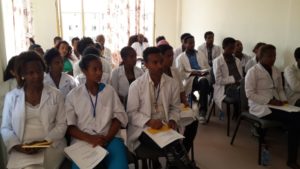The SIAPS team has helped the Ethiopian Food, Medicine, and Health Care Administration and Control Authority (FMHACA) and many health facilities in the country incorporate product quality reporting into its national adverse drug event (ADE) reporting system. This has proven to be an efficient and cost-effective measure to detect products with problems in quality and can be replicated in other low-income countries.

SIAPS has been working with the FMHACA since 2011 to build the capacity of the national pharmacovigilance center. That work included assisting the center to expand its existing ADE reporting system to identify medication errors and product quality issues. To help increase awareness of the expanded ADE reporting system among health care providers, the SIAPS team, along with the FMHACA, conducted trainings and face-to-face discussions at health facilities and distributed pharmacovigilance tools and documents, including newly revised ADE forms, throughout the country.
Following these activities, the annual number of ADE reports increased almost nine-fold from 2012 to September 2016. The FMHACA instituted a new forum to review ADE reports related to product defects that included staff from its pharmacovigilance unit as well as its product registration, facility inspection, and quality control directorates. Approximately 1,500 reports have been received since 2012, and of those, 220 had suspected product quality issues, such as visible irregularities, unexpected or unintended reactions in the patient, and packaging problems.
Further investigations and analyses of the information led to the recall of almost two dozen products, the temporary closure of one manufacturing facility, the suspension of a marketing authorization license, and the cancellation of production for one product. In 2016 alone, an analysis of ADE reports received by the pharmacovigilance center resulted in regulatory measures on nine products, including an intravenous infusion for women during childbirth and a pediatric syrup, which could have had grave consequences for patients.
“SIAPS is gratified with the advances being made at FMHACA with regard to use of the ADR reporting system to include other adverse events, so that products with quality problems can be detected. It’s a successful practice that can be applied in other resource-limited countries where it is almost impossible to do regular post marketing quality surveillance, which is quite an expensive exercise,” says Hailu Tadeg, SIAPS Country Program Director in Ethiopia.
New online tool helps speed product registration
The FMHACA recently issued its first product marketing authorization certificate using the Medicine Information Registration System (MIRS), a SIAPS-supported, web-based tool that helps national medicines regulatory authorities streamline and track the medicines registration process. The launch followed a two-year development effort by the FMHACA and SIAPS teams in Ethiopia and the US headquarters office.
With help from SIAPS, the FMHACA team transferred all existing data on registered medicines into the system, creating a comprehensive, standardized, easy-to-access product database. Using the MRIS program, staff can more easily and quickly assess and track applications. It also supports information sharing across regulatory units. Applicants can submit and track progress of an application remotely without having to visit the FMHACA offices, which saves time and resources for both the FMHACA and clients.
“This system means the Ethiopian regulatory authority will be able to better address issues of efficiency, transparency, and information for decision-making challenges in relation to medicine registration – which was badly needed,” Tadeg says. By reducing the amount of time it takes to review applications and approve products, the FMHACA can help patients gain access to essential medicines sooner.
SIAPS is preparing to hand over full management of the MRIS to the FMHACA. The program has also been implemented in Namibia and Mozambique and will soon be launched in Bangladesh.
— Stacy Lu, SIAPS Technical Writer

